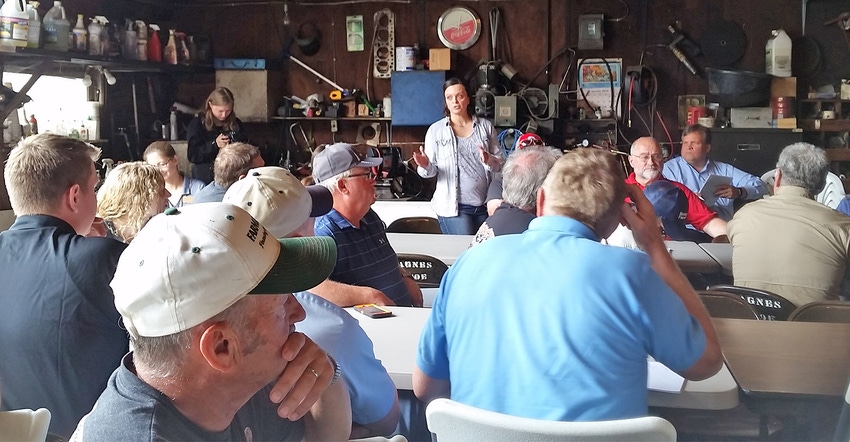
Low milk prices, the factors that may impact them and the individuals who receive them were discussed June 12 in Roscoe, Minn., at a Rural Dairy Discussion hosted by the Minnesota Farmers Union.
The meeting was one of two hosted by MFU. This one was held on the dairy farm of the Mike and Krista Osendorf. A second meeting was scheduled for the following day in Mazeppa, Minn.
On the MFU listening panel in Roscoe were MFU President Gary Wertish, Andrea Vaubel, Minnesota Department of Agriculture assistant commissioner; and Patty Edelburg, National Farmers Union vice president, who also is a dairy farmer from Amherst Junction, Wis. MFU’s membership and outreach director, Bruce Miller, served as moderator.
Wertish opened the meeting by explaining its purpose: simply to listen and hear what was on the minds of those in attendance.
Low milk prices and curbing milk production were mentioned multiple times by folks there.
“We need to get milk prices up,” said one.
“No more Band-Aids,” commented another farmer. “We have to curb production. I think it needs to start with milk plants. … When we have $25 milk, everyone adds cows, and then we’re down to $12 milk.”
Concerns were voiced about the large numbers of small- and medium-size dairy farms going out of business, while large dairies with 6,000 cows or more are going up.
“The farms that quit have been more than made up by large dairy investors,” the second farmer continued. He wondered if the mega-dairy farms are really able to produce milk cheaper than other farms.
“I used to be, too [producing milk cheaper]. Cheap feed made cheap milk and more milk, too,” this farmer said, adding, “but not anymore.”
Canadian dairy farmers at similar Wisconsin meetings
A dairy farmer from Barron County, Wis., attended the meeting and shared that the Wisconsin Farmers Union held similar listening sessions in his state and invited Canadian dairy farmers to explain their milk quota system.
“They were very articulate and thorough in explaining their system,” he said. “[Prior to the quota system] they had dealt with so many of the things we are dealing with.”
The Wisconsin farmer continued: “We have a perfect storm here [in the U.S.] The technology, genetics, facilities — all are conducive to expansion. The system that is in place facilitates large non-family dairies,” he said. “We need to look at a system like in Canada. … A farmer gets [paid] cost of production plus a profit.”
A dairy industry spokesman said he was not in favor of supply management, as in Canada. Rather, he said, the industry needs more dynamic pricing, such as new ways to pay for milk fat and protein.
Others added comments on immigrant labor and possible impacts on farm income; retail and milk trucking advantages for mega-dairies versus smaller farms; rising health insurance premiums; and road and bridge repairs.
At the end of the listening session, Wertish promised a report on the two meetings and that comments will be delivered to local, state and federal policymakers, with suggestions on how to improve the future of dairying.
“I’m not interested in representing cows or acres,” Wertish said. “I’m interested in representing farmers. We need more farmers on farms. … Price fixes things on farms.”
About the Author(s)
You May Also Like






